'Zero Waste' Purina reacts to fish kill caused by mishandling of its wastewater
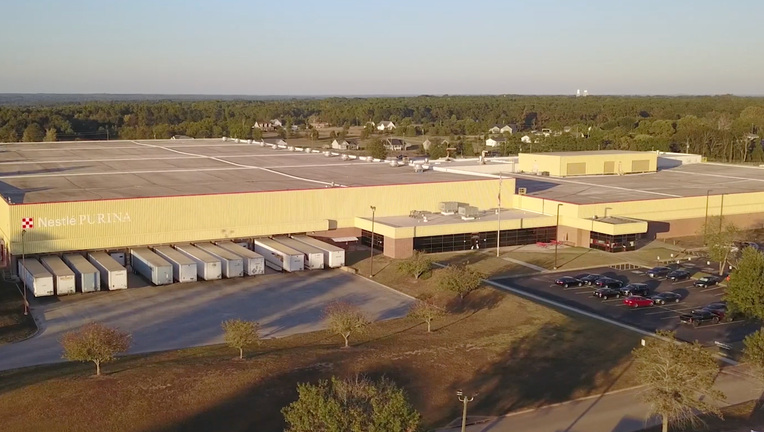
Nestlé Purina's pet food plant in Hartwell produces "Zero Waste" according to the company. But more than one million gallons of its wastewater wound up at the site of a fish kill. (photo from Nestle Purina press release video)
WASHINGTON, Ga. - A north Georgia company that makes pet food proudly says it generates "Zero Waste."
That’s why Nestlé Purina is not happy that at least one million gallons of its liquid waste wound up on a defunct Wilkes County dairy farm and, even worse, caused the death of hundreds of fish in a nearby river.
A spokesperson called what happened "unacceptable."
The June 16 incident took place along the Little River near Washington. According to documents from the state Environmental Protection Division and the Georgia Department of Agriculture, McAvoy Farms accepted more than one million gallons of wastewater in just six weeks, sludge generated from the cleaning of pet food tanks at Purina’s Hartwell facility.

I-Team: 'Zero Waste' Purina reacts to fish kill caused by mishandling of its wastewater
By Randy Travis Published August 17, 2022 WASHINGTON, Ga. - A north Georgia company that makes pet food proudly says it generates "Zero Waste." That?s why Nestl� Purina is not happy that at least one million gallons of its liquid waste wound up on a defunct Wilkes County dairy farm and, even worse, caused the death of hundreds of fish in a nearby river. A spokesperson called what happened "unacceptable." The June 16 incident took place along the Little River near Washington. According to documents from the state Environmental Protection Division and the Georgia Department of Agriculture, McAvoy Farms accepted more than one million gallons of wastewater in just six weeks, sludge generated from the cleaning of pet food tanks at Purina?s Hartwell facility. FULL STORY: https://www.fox5atlanta.com/news/zero-waste-purina-reacts-to-fish-kill-caused-by-its-wastewater
The state called the sludge "soil amendments" and considers it a suitable replacement for fertilizer, allowing farmers to recycle organic waste that otherwise would be dumped into water treatment plants or landfills.
But inspectors say the McAvoys ignored application guidelines, allowing the Purina sludge to flow into the nearby creek. A total of 1696 fish died from exposure to the sludge and sudden lack of oxygen in the water, according to inspectors.
A neighbor said the mixture had a strong chemical smell.
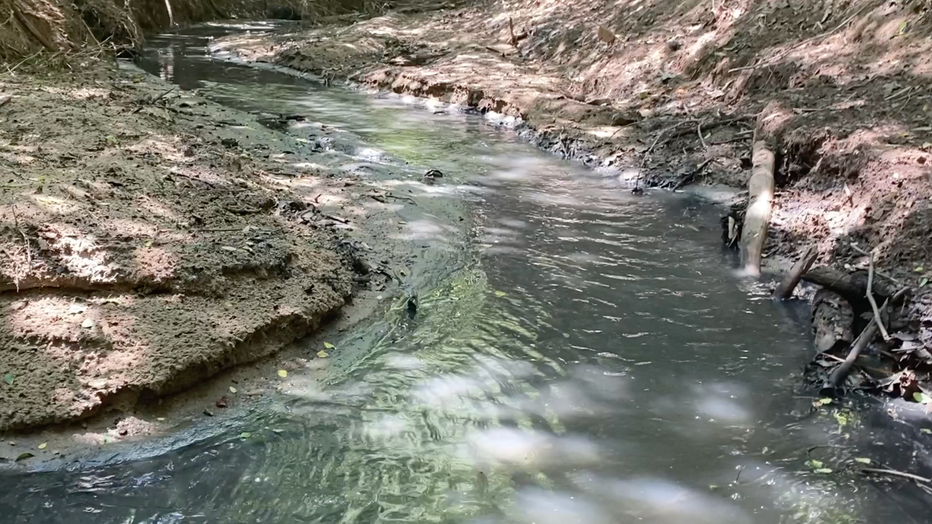
An EPD inspector documented the "sludge and gray/black wastewater" near the defunct dairy farm in Wilkes County. (Image from EPD)
A request for comment from the McAvoy family went unanswered.
Inspectors say the McAvoys sprayed the mixture onto open fields without tilling it into the soil per state rules.
"It's tragic and reprehensible," said Agriculture Commissioner Gary Black. His office is investigating any violations of soil amendment rules.
"Our contracts with partners who collect and use this organic matter are very clear in the requirement that it be transported and applied at a controlled rate directly from enclosed systems to the field subsurface through plow injection," Purina said in a statement.
On its website, Purina proudly says it has achieved "Zero Waste for Disposal across all company manufacturing operations…" proclaiming "we believe in a cleaner planet for future generations."
Pictures from the fish kill show anything but a cleaner planet. Ominous dark streaks from the sludge run downhill from the containment ponds where the soil amendment was originally dumped.
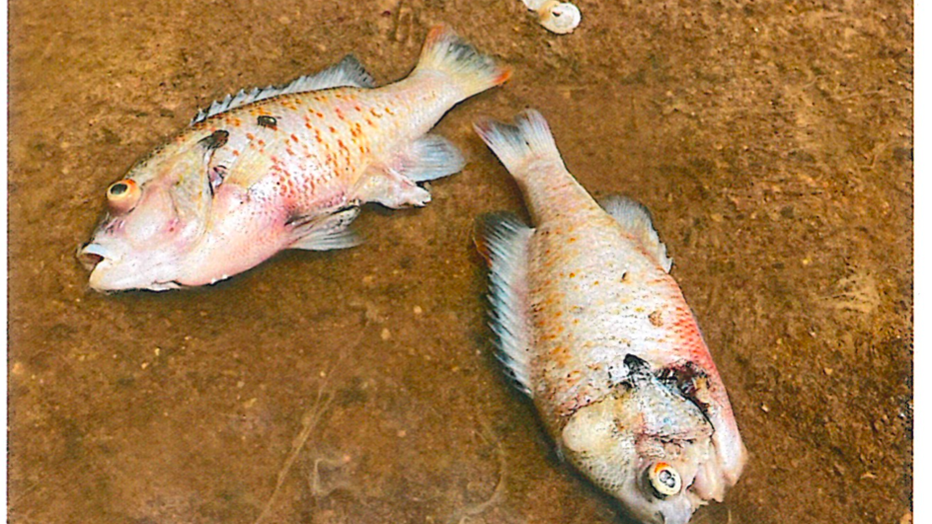
Two of the 1696 dead fish found where the soil amendment leaked into a nearby creek. (photo by EPD)
The McAvoys have been ordered to hire a state-approved contractor to remediate the damage caused by the spill.
"They (Purina) have an obligation to make sure it’s disposed of correctly," said Tonya Bonitatibus, executive director of the Savannah Riverkeeper. "And I think it’s pretty clear that was not what was happening in this case."
The Savannah Riverkeeper is a non-profit dedicated to preserving the river basin.
Many residents of rural Georgia complain the state has ignored their concerns about soil amendments and the stench it often brings.
"I think anybody who lives in rural Georgia, a rural area in any state needs to be aware because it could be coming, it absolutely could be coming to your backyard," warned Donna Blanton.
She lived near a similar operation in Oglethorpe County before finally selling her house and moving to another county.
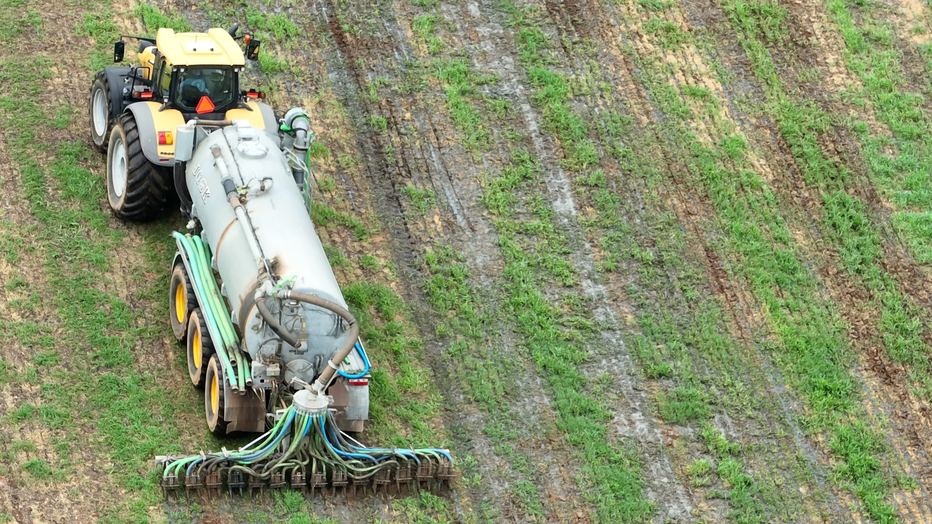
Despite pooling of soil amendment on this Madison County farm, the GA Department of Agriculture says this is an acceptable way of applying soil amendment. According to EPD inspectors, this is not how it was done on the farm that led to the fish kill.
Neighbors have no say over where soil amendments are sprayed. They worry about what’s in the liquid and whether it could harm more than just fish.
Bonitatibus of the Savannah Riverkeeper has warned about the danger of soil amendments for years.
"I think that’s a huge cause for concern," she said. "Where is all this stuff coming from? Because nobody really knows the answer to that."
Purina used a third-party company — Cementitious Solutions from Madison County — to process their pet food tank waste into a material called Proponic Solutions H-96.
Jeff Johnson, a neighbor who lives near the fish kill, said he saw a company called Waste Eliminator delivering the material.
No one from any of those companies returned requests for comment.
"Sometimes (the tankers) would meet each other at the intersection up here," said Johnson. "That’s how many of them there were."
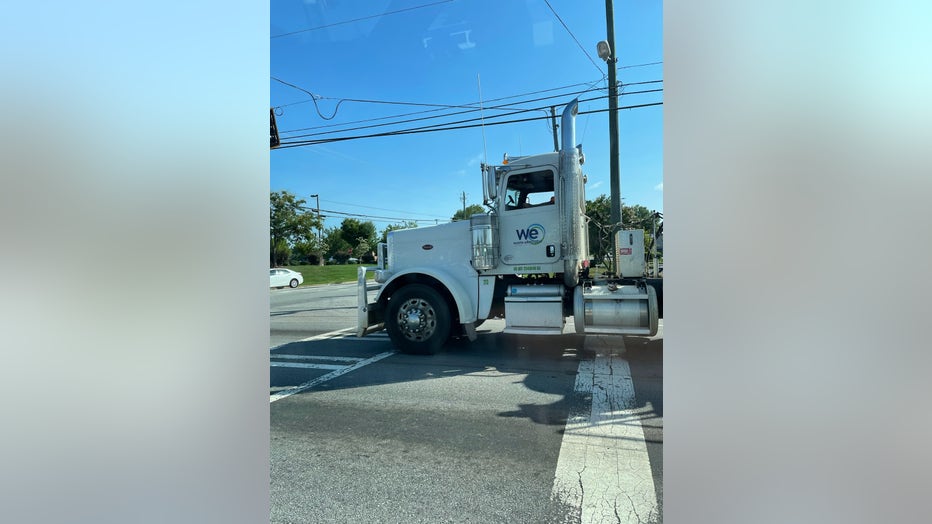
A neighbor says he saw a constant stream of Waste Eliminator tankers like this deliver liquid waste to the Wilkes County farm blamed for the fish kill. No one from the company responded to questions from the FOX 5 I-Team.
"We do not allow these materials to be applied to or accumulate onto the surface," said Purina’s spokesperson. She called what happened "unacceptable" and the company is reviewing its contract.
"I think they should bear a very strong responsibility that they at least stop the contracts that they have with those that are not properly disposing of their waste," said Bonitatibus.
She and others point out that like that old dairy farm, often the landowners who take the soil amendments don’t actually produce any crops.
"If you are not producing a sellable product, you are not a farm," she argued.
"You are a dump."
Because of renewed public interest, the Department of Agriculture is accepting comments about its soil amendment rules for an additional month. Click here for more information.
Here's Purina's full statement:
"Purina does and will always follow state, local and federal guidelines in all areas of our operations and business. The use of organic matter - in our case, water collected after being used to rinse our pet food equipment - when done correctly, and in accordance with Department of Agriculture rules, has documented benefits to soil health and contributes to a healthy ecosystem.
Our contracts with partners who collect and use this organic matter are very clear in the requirement that it be transported and applied at a controlled rate directly from enclosed systems to the field subsurface through plow injection. We do not allow these materials to be applied to or accumulate onto the surface. This controlled method greatly reduces odors and flies and pushes the nutrients from the organic matter directly into the soil for the desired benefit. The organic matter, by our contract terms, should never be dumped onto a field or into any body of water. Doing so is a violation of our agreement.
Our quest to maintain a zero waste for disposal operation relies on beneficially reusing and recycling materials that improve the environment. Any actions taken by others that are counter to this goal are unacceptable and will be addressed. We are committed to contributing to a healthy planet that we can share with our pets."

